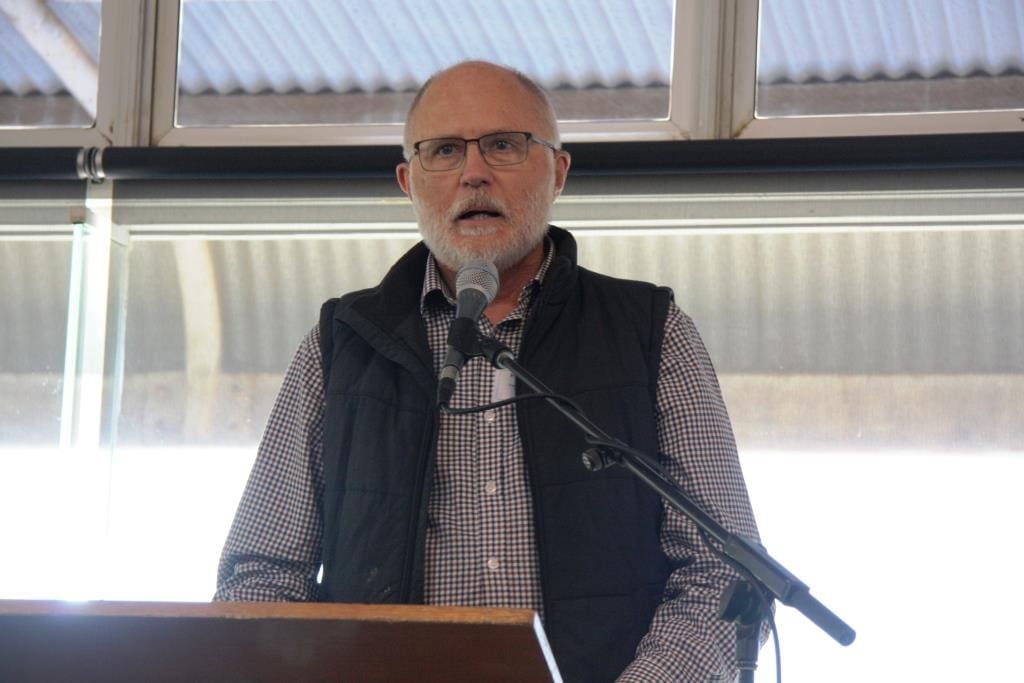
University of Melbourne Professor of Sustainable Agriculture Richard Eckard addressed the 2023 Cotton Collective forum.
THE value of insetting and biodiversity, and company rather than government targets, loomed large in a presentation on carbon and cotton farming given last week by University of Melbourne Professor of Sustainable Agriculture Richard Eckard.
Speaking at Cotton Australia’s Cotton Collective forum in Toowoomba, Prof Eckard advised caution for growers stepping into the carbon arena, which he said was rife with misinformation.
“If you want advice on carbon farming, don’t go to someone who’s selling carbon,” Prof Eckard said.
“Getting independent advice on where we go with carbon is really difficult in Australia right now.”
Heed the companies
Australia has committed to reducing its greenhouse gas emissions in 2030 by 43 percent from their 2005 levels, but as an export-focused producer, Prof Eckard said targets in the private sector were of greater significance.
“We should care more about what banks and companies are thinking.”
He said multinational and domestic companies with formidable supply chains, including Cargill, Coles and JBS, have also set targets.
Prof Eckard has been researching the relationship between carbon, emissions and agriculture in Australia for close to 20 years, and said conversations he has had with corporations show their problems about reducing emissions were more pressing than government ones.
“They say: “We’ve set a target but we have no idea how to get there; can you help us figure out how to do this?
“In the local market, banks are just as nervous about what they’ve said as you are…so we’re in this journey together.
“They’re nervous to come to you and say: ‘Can you reduce your emissions?’ because they don’t like telling you what to do.”
Prof Eckard said what is coming for growers is an increased importance on carbon audits, because corporates will look at a range of farms across Australia and select the lower-emissions operations as suppliers.
“What it means for us as an industry is best practice now for nitrogen-use efficiency for any efficient production system is what will get you first in the door, and then we wait for big breakthroughs to come to actually drop that number further down.”
He said that may appear in the form of nitrogen fertiliser coated to reduce emissions, and therefore boost efficiency in the farming system, and production.
“If we just aim for efficient production, we meet demand that’s out there.”
Look beyond soil carbon
Prof Eckard warned against producers selling carbon credits to offset emissions created in other sectors, with the Western Australian equation a case in point.
“This idea that there’s plenty of soil carbon available in the land sector to bail out the mining industry is quite fanciful.”
He said the agricultural sector has its own targets to meet by 2030, and therefore needed to keep its carbon in-house to offset its own emissions if necesaary throughout the supply chain.
“While some people might say we have a surplus to sell, we simply don’t.
“The language has started changing; insetting means you’re keeping it inside your business because it’s part of your business.”
He said if all of the WA Wheatbelt was planted to trees, it would only achieve a 50pc offset for the state’s mining industry, and would in the process forsake an economically viable and productive cropping system with the ability to sequester carbon.
“They’ve got to sort their own problems out,” he said of the mining sector.
Carbon, emissions in mixed message
Prof Eckard said the time has come for Australia to recognise the fundamental difference between carbon storage in soils and trees, and reducing emissions of nitrous oxide.
“Trees will grow up to a certain age and then they drop as many limbs as they grow, so they don’t store carbon in perpetuity.
“You can stop looking at that as an infinite resource.”
“And the more you sell out for short-term gains, the less you have to offset against your own supply chain by 2050.
“We reckon about 85pc of the annual change in soil carbon in Australia is actually just rainfall, so let that sink in.
“There is a lot of enthusiasm around soil carbon when in actual fact we don’t really manage a lot; the rainfall manages it for us.”
Likewise, he said non emissions will not weigh into carbon-accounting equations post 2030.
“If you reduce the rate of fertiliser, or you put a coated fertiliser on your pasture or on your crop, and as a result, there is 50pc less nitrous oxide, that just didn’t happen.
“The banks are starting to figure out the risk profile between these two.”
Value in biodiversity
Prof Eckard said carbon accounting generally overlooked biodiversity in its “fairly myopic” method.
“It’s really important for us to keep the long game in mind as well.”
“What we don’t want is to do things for carbon that lock us out of biodiversity…by the time we get to 2030.
“I mention this because in New Zealand, policy is driving people to plant trees into sheep pastures.”
While it offers a big carbon return in the short term, Prof Eckard said in the longer term it means land is lost to production, carbon is exported out of the property, and biodiversity is lost through the establishment ofa monoculture.
“They’ll realise the world cares about biodiversity, and they’ve got pine trees.”
Prof Eckard has predicted that some industries will be trading off ESG parameters against each other.
“You might find the Kimberley cattle industry can’t do anything about methane – they don’t even know where the cows are – but they’ve got great biodiversity.
“We might be trading these against each other to actually meet the market demand.”
Grain Central: Get our free news straight to your inbox – Click here

HAVE YOUR SAY